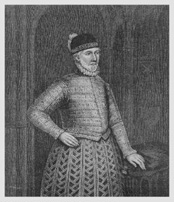The Good, the Bad and the Unready (37 page)
Read The Good, the Bad and the Unready Online
Authors: Robert Easton

Christopher III, king of Denmark, Norway and Sweden, 1418–48
The good-natured, easy-going but none-too-enterprising Christopher enjoyed his beer far more than the vexing affairs of state, and discontent with his indolence increased exponentially when a string of bad harvests compelled his peasants to mix ground tree-bark with their flour to make bread. Out of sympathy, the king apparently joined his subjects in eating these ‘bark buns’ –a practice that may have contributed to his early death.
 Henry the
Henry the
King of Brave Men
see
Henry the
GREAT
 Louis the
Louis the
King of Slops
Louis XVIII, king of France, 1755–1824
For much of his life Louis was a king without a kingdom, and Europe’s elite had little time for him. Occupied with the machinations of Napoleon the
LITTLE CORPORAL
, they dubbed this brother of Louis XVI ‘le Roi Panade’ –literally ‘the Bread-Soup King’. This was not a gastronomic nickname, however, but an economic one, suggesting that Louis, exiled and without a traditional royal income, was fiscally ‘in the soup’. E. Cobham Brewer, the compiler of the famous
Dictionary of Phrase and Fable
, translates ‘Roi Panade’, somewhat harshly, as ‘the King of Slops’.
Modest, yet ever optimistic about the royalist cause despite
Napoleon’s success, Louis spent nineteen years away from French soil waiting for the right moment to reclaim the throne. In the spring of 1814 it seemed that moment had come. The English stopped calling the chubby old gentleman who had been quietly living among them ‘Bungy Louis’ and instead hailed him as ‘the Desired’, encouraging him to consolidate the peace that Arthur the
IRON DUKE
had done so much to win for him.
After the battle of Waterloo, Louis returned to France where, apart from the Hundred Days when Napoleon attempted to reclaim power, he spent the next nine years doing his level best to rule as a constitutional monarch. But it was hard work. Louis was in his sixties, obese and suffering from gout, and as his health grew more feeble, so did his influence. On his deathbed in September 1824 Louis is reported to have sighed morosely that ‘a king should die on his feet’.
 Louis Philip the
Louis Philip the
King of the Barricades
see
Louis Philip the
CITIZEN KING
 James the
James the
King of the Commons
see
James the
ILL-BELOVED
 Edward the
Edward the
King of the Sea
see
Edward the
BANKRUPT
 King Oliver
King Oliver
see
NOSE ALMIGHTY
 Richard the
Richard the
Kingmaker
Richard Neville, sixteenth earl of Warwick, 1428–71
Through his marriage to Lady Anne de Beauchamp in 1449, Richard Neville acquired not only the title of earl of Warwick, but also sizeable estates throughout England, making him one
of the most powerful men in the country. His increased wealth and political influence enabled him to carve out for himself the role of kingmaker – instrumental in the fortunes of two men who were both vying for the English throne.

Richard the
Kingmaker
First, Richard wielded his power to negotiate the deposition of Henry the
MARTYR
in favour of his own cousin Edward the
ROBBER
, but when Edward proved treacherously ungrateful, Richard drove him into exile and restored Henry to the throne once more. Richard’s military dexterity did not match his brilliant, manipulative political skill, however, and he was killed a few months later, fighting against Edward’s forces at the battle of Barnet.
 Anne the
Anne the
King’s King
Anne, duke of Joyeuse, 1561–87
Having wantonly ousted a host of court favourites, the capricious and louche Henry the
MAN-MILLINER
appointed Anne (a male name in sixteenth-century France) as his new right-hand man, hoping that this ambitious champion of Roman Catholicism would maintain administrative order while he engaged in the serious businesses of fashion design and puppy-training.
As the new duke of Joyeuse, Anne revelled in his near-absolute authority and in his nickname of ‘the King’s King’, which suggested where true royal power lay. But he was as arrogant, selfish and foolish as his monarch and met his nemesis when facing the Protestant forces of Henry of Navarre, the future Henry the
GREAT
, at the battle of Coutras in October 1587.
Anne amassed a brightly coloured army, double the size of
Henry’s plainly dressed and rather shabby Huguenot troops, and, confident in his cavalry and of victory, he and his men scoffed as the Huguenots sang a psalm before the engagement. Disobeying royal orders (not for the first time), Anne had his troops attack, but the better-prepared Protestants slaughtered them in their thousands, and ‘King Anne’ was killed in the act of surrender.
 John
John
Lackland